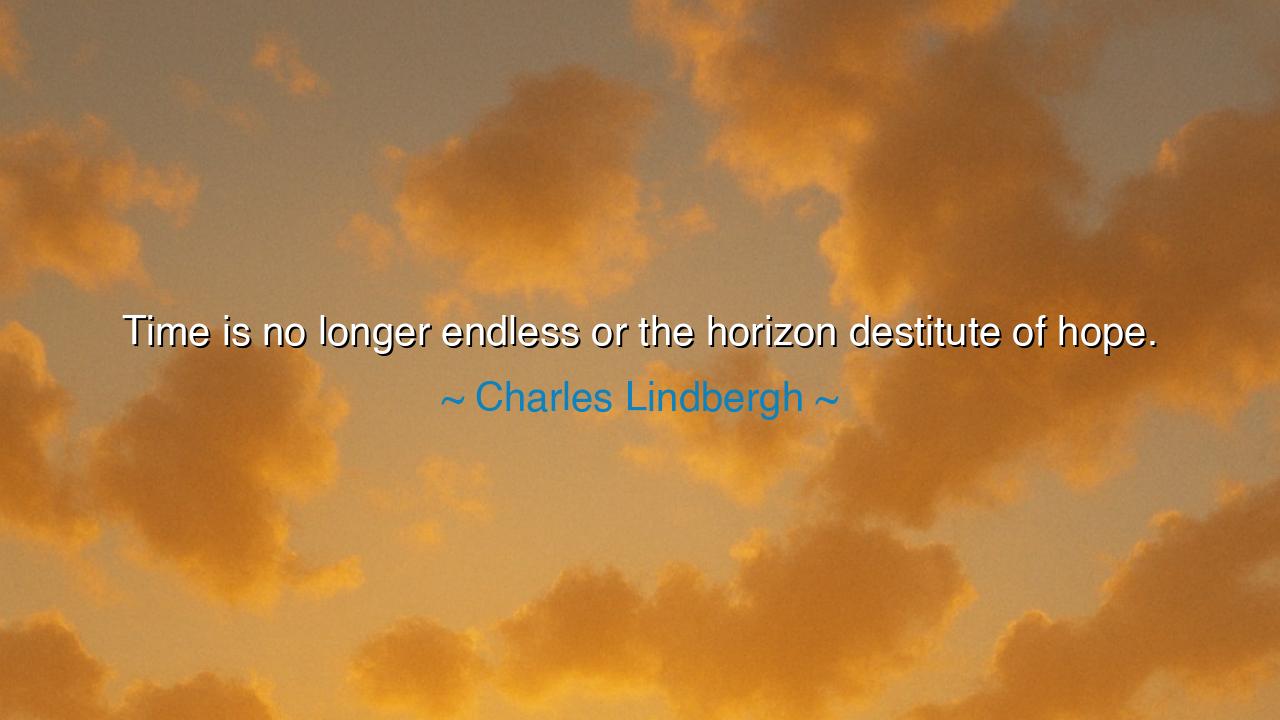
Time is no longer endless or the horizon destitute of hope.






When the aviator Charles Lindbergh declared, “Time is no longer endless or the horizon destitute of hope,” he spoke not merely as a man of flight, but as a man who had seen the boundaries of earth and sky dissolve before his eyes. His words arose from that sacred moment when humanity first realized it could rise above the world it once thought it was bound to. This quote is not about minutes or hours—it is about awakening, about the realization that the human spirit is limitless, and that even time, which once seemed eternal and indifferent, can be transformed by hope and purpose.
In the age before Lindbergh’s flight, the horizon symbolized the unreachable—that distant line where dreams faded into the unknown. Time stretched like an endless desert, and men felt small before the vastness of existence. But when Lindbergh crossed the Atlantic alone in 1927, from New York to Paris, he shattered that illusion. He showed the world that courage and vision could compress eternity into a single act of faith. In that moment, the horizon was no longer a barrier but a promise, and time was no longer infinite and empty—it became alive with meaning.
The ancients, too, spoke of such transformation. They believed that time was shaped not by the stars but by the heart’s will. The hero who dares, they said, alters the course of destiny itself. When Gilgamesh sought immortality, when Odysseus braved the sea, when the Buddha sought enlightenment beneath the Bodhi tree—all were, in their own way, reshaping time. They turned the endless flow of days into a journey toward purpose, proving that it is not eternity that gives life meaning, but the courage to fill fleeting moments with greatness. Lindbergh’s flight was a modern echo of that ancient quest—a bridge between earth and heaven, between fear and hope.
Yet these words carry more than triumph. They speak also of humility. To say that “time is no longer endless” is to acknowledge that human life is finite, fragile, and precious. Lindbergh himself, after tasting the glory of the skies, came to understand that progress without spirit is hollow. As the world grew faster, he feared it was losing its soul. His quote reminds us that time, once infinite, now feels short precisely because we have learned how much can be done within it—and how easily it can be wasted. To live with awareness of time’s brevity is not despair, but wisdom; it is the call to live deeply, purposefully, and gratefully.
And when he spoke of a horizon “no longer destitute of hope,” Lindbergh gave voice to the timeless human longing for meaning beyond the material. Hope, he knew, is the fuel that drives invention, the light that guides explorers through darkness. Without hope, horizons are barren; with it, even the smallest step becomes a pilgrimage. His flight was not just an achievement of engineering—it was an act of faith. He trusted the unseen, just as every dreamer must trust the winds that cannot be measured.
Think of the astronauts who later followed his path, breaking free from the atmosphere to see the Earth as a blue jewel suspended in infinity. They, too, echoed Lindbergh’s realization: that time and distance are no longer obstacles but bridges; that the horizon, once feared, is now a threshold to new creation. Each generation of pioneers carries that same torch—the belief that the limits of today are the foundations of tomorrow.
So, my children of the present and the future, take this teaching to heart: time is not to be endured—it is to be used. The horizon is not to be feared—it is to be pursued. Live as those who know that each moment matters, that every breath carries the power to change the world. Let hope be your compass, and courage your wings. For when you fill your time with purpose, you make eternity your ally, and the horizon, once distant and cold, blooms with light.
And remember this truth: the end of endless time is not the coming of death—it is the birth of meaning. When you realize that time is finite, you begin to live fully. When you see that the horizon is alive with hope, you begin to create worlds. So rise, as Lindbergh did, into the winds of destiny, and let your journey remind the generations to come that time, when filled with purpose, is eternity made visible.






AAdministratorAdministrator
Welcome, honored guests. Please leave a comment, we will respond soon